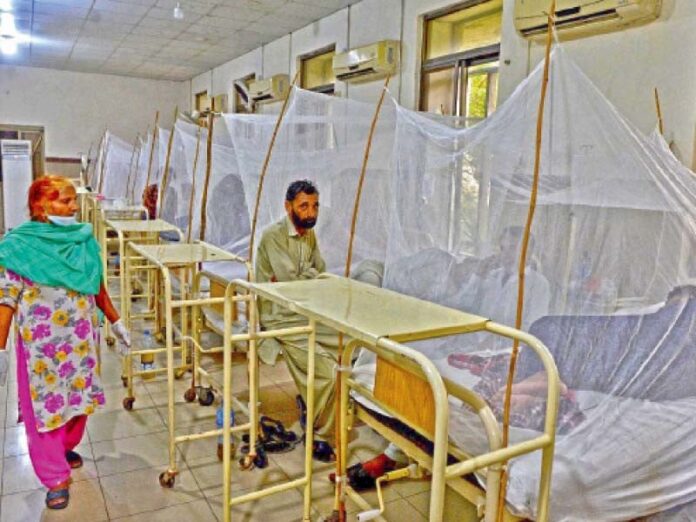KARACHI:
As the world finally breathes a sigh of relief following the end of the coronavirus emergency, one valuable lesson to have emerged is the importance of disease prevention, however, for those holding the reins of power in Pakistan’s commercial hub, virus control still lies abysmally low on the priority list.
Inaugurated in 2013 by the Health Department of Sindh, the Dengue Control and Prevention Program, combined a team of 63 employees with the aim of controlling the spread of the mosquito-borne vector disease among citizens through its spatial fogging activities across areas in the port city.
However, in 2017, the department decided to nullify the permanent status of the employees, by offering them contracts on a temporary basis instead.
Three years later in 2020, the dengue program’s office, spray machines and cars were shifted from Karachi to Hyderabad at a time when 10 employees had quit their jobs out of their dissatisfaction.
Read Epidemic feared as dengue cases rise
“I had not received my salary for several months and was only employed on a temporary basis therefore I chose to leave the job,” shared Abdul Quddus, the field supervisor of the dengue program.
Apart from Abdul Quddus, former procurement officer Sikander Hussain Shah, field worker Yunus and computer operator Saad Aslam, too reportedly left their jobs for similar reasons in 2020.
Fast forward to June 2023, the 53 remaining employees too were fired unexpectedly by the department without extending their contracts or clearing their dues. “We tried contacting the director of the program in order to inquire about the status of our contracts and our pending paychecks but were told that our jobs had ended,” complained a dismissed employee, on the condition of anonymity, who further added that he had approached the courts for non-payment of their salaries.
According to Irfan Abro, Admin Officer for the dengue program, the contracts of 63 employees were terminated on June 30th after the Sindh government’s decision in 2020 to merge the Dengue Control and Prevention Program and the Malaria Control Programme into the Vector-Borne Disease Program.
Since the field work was the same in each program, the contracts of the malaria program employees were renewed while those of the dengue program employees were nullified.
“Therefore, dengue control has hit rock bottom in the past three years. The irony being that the budget allocated for dengue prevention has continuously risen during the same time frame, even though no relief has been provided to the citizens from the virus,” asserted Abro, who went on to claim that the dengue control budget rose from Rs 50.8 million in 2021-2022 to Rs 61.6 million in 2023-2024.
According to the results of 100 entomological surveys carried out in different districts of Karachi from 2022-2023 for identifying mosquito hotspot areas in the city, several popular areas including Karachi East, Gulshan Iqbal, Jiwani Heights, Hilal Park, Badar Commercial Area, Bukhari Commercial Area, and Lyari were infested with mosquitos and their larvae.
“This year it is expected that the number of cases will only rise since a novel variant of the dengue virus known as the mixed serotype has been discovered,” informed Dr Saeed Khan,
Head of Molecular Pathology at the Dow University of Health Sciences, who urged the government to control the spread of the life-threatening disease.
Dr Khan’s fears can be deemed valid given the record number of cases and deaths that have been reported in the past from Karachi. As per data from the Dengue Control and Prevention Program, 6,739 cases and 28 deaths were registered in 2021, 23,274 cases and 62 deaths in 2022 and 861 cases have been noted from January to August of this year.
Speaking to the Express Tribune on the matter, Dr Mushtaq Shah, Project Director of the Dengue Control and Prevention Program said, “fogging is not our responsibility since it is the duty of the District Health Officers from the Karachi Metropolitan Corporation (KMC) and District Municipal Corporation (DMC) to oversee dengue fumigation.”


1734894422-0/Copy-of-Untitled-(72)1734894422-0.png)




